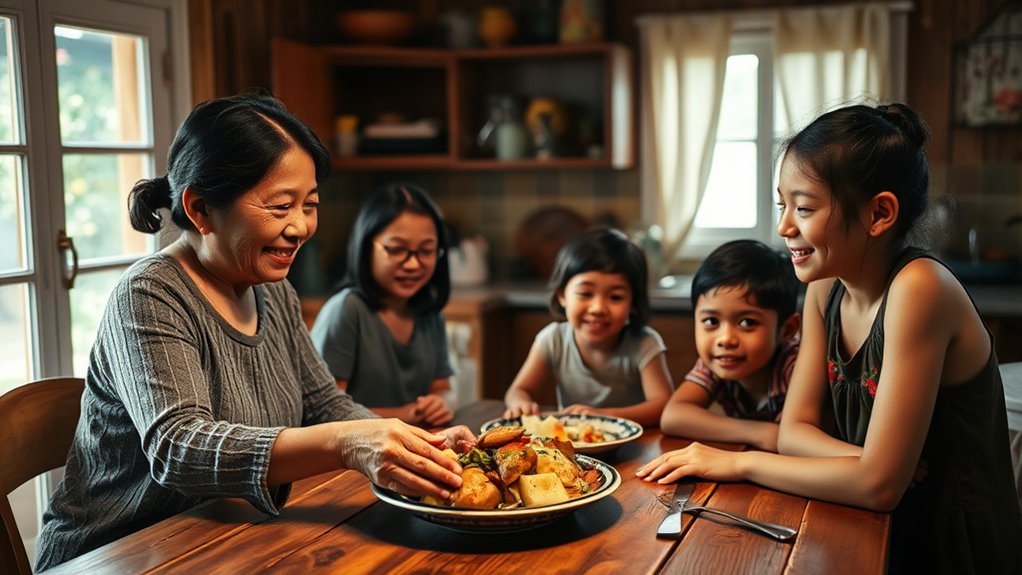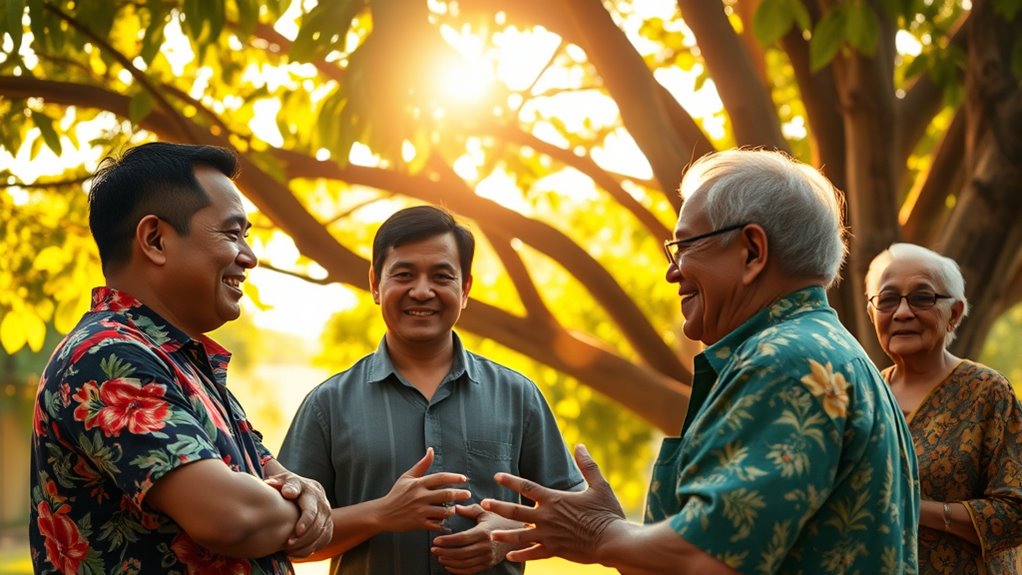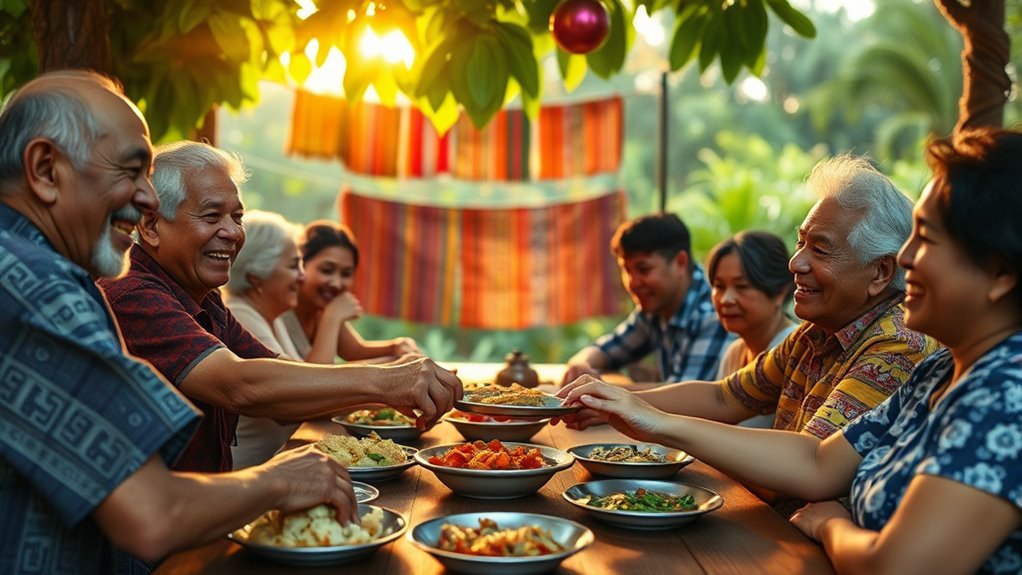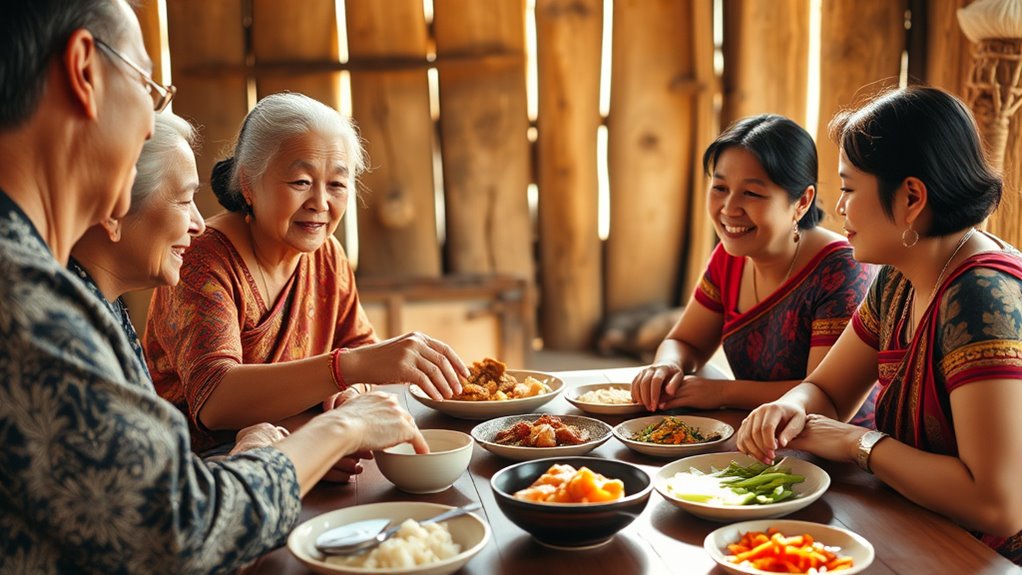Respect is essential in Filipino relationships, influencing family, romantic, and social dynamics. It guides your interactions, as you honor elders and value one another’s opinions. By using respectful language like “po” and “opo,” you foster deeper connections. In romantic settings, respecting boundaries and traditions enhances understanding and harmony. Overall, embracing respect nurtures unity and trust, creating supportive environments. If you’re curious about how respect manifests in various contexts, there’s more to discover.
Key Takeaways
- Respect guides interactions, ensuring harmonious relationships among family members, friends, and romantic partners in Filipino culture.
- Honoring elders through respectful language and gestures fosters strong familial bonds and cultural continuity.
- In romantic relationships, respecting individuality and personal boundaries nurtures trust and understanding between partners.
- Respectful communication in social settings enhances engagement and builds lasting connections in both personal and professional contexts.
- A foundation of mutual respect in educational environments promotes inclusivity, discipline, and open dialogue among students and teachers.
The Role of Respect in Filipino Culture

Respect plays an essential role in Filipino culture, shaping interactions across various facets of life. When you welcome guests, you treat them with utmost hospitality, often offering your best resources.
In conversations, using respectful language like “po” and “opo” shows your deference to elders and superiors. You also address people with respectful titles, such as “Sir” or “Ma’am,” which fosters a respectful environment.
Cultural traditions like “pagmamano” reinforce these values, allowing you to honor your elders through meaningful gestures. Additionally, respect extends to embracing cultural diversity, valuing different perspectives, and ways of thinking.
Respect in Family Dynamics

In Filipino families, the principle of honoring one another shapes everyday interactions and decisions. You’ll notice that respect for elders is paramount, guiding family dynamics and decision-making. This respect fosters harmony and reinforces the hierarchy within the household.
As multiple generations often live together, grandparents play an essential role in imparting wisdom and cultural values to younger family members. You’ll find that maintaining respectful communication strengthens bonds not just with immediate relatives but also with extended family and community.
This emphasis on respect creates a supportive network, nurturing unity and cultural continuity. By prioritizing respect, you contribute to a cohesive family environment, ensuring that traditional values endure despite modern influences.
Respect in Romantic Relationships

When maneuvering romantic relationships in the Philippines, honoring each other’s individuality and values is essential.
Respect plays a pivotal role, especially in traditional courtship, where showing regard for your partner’s family is vital. You’ll find that respecting personal boundaries fosters a nurturing environment, allowing both partners to feel secure.
Embracing differing opinions can enhance understanding and harmony in your relationship. Politeness in communication reinforces respect, helping you resolve conflicts smoothly.
Additionally, keeping public displays of affection minimal reflects consideration for societal norms. Ultimately, practicing respect signals your commitment and intentions, laying a solid foundation for a lasting relationship.
Impact of Respect on Social Interactions

Building on the importance of respect in romantic relationships, it greatly shapes social interactions as well. In Filipino culture, respect is fundamental, influencing how you communicate and engage with others.
Using respectful language and gestures, like “po” and “mano,” shows acknowledgment of social hierarchies and fosters deeper connections. Respectful interactions build trust, essential for personal and professional relationships. Additionally, practicing essential oil safety emphasizes the need to research each oil’s properties before use, highlighting the importance of informed decisions in all aspects of life.
When conflicts arise, a respectful approach promotes understanding and constructive dialogue, reducing misunderstandings. Communities thrive on mutual respect, creating inclusive environments where everyone feels valued. Practicing respect aligns with the concept of emotional alignment, which is crucial for nurturing healthy relationships.
Ultimately, practicing respect not only enhances your interactions but also strengthens the bonds that unite you with family, friends, and the community, making social settings harmonious and supportive.
The Importance of Respect in Education

Respect serves as the backbone of a productive educational environment, fostering a space where both students and teachers can thrive.
When teachers model respect, they create a welcoming atmosphere that encourages student engagement and participation. Recognizing cultural backgrounds is crucial for inclusivity, allowing every student to feel valued.
Respectful communication promotes open dialogue and builds trust, essential for effective teaching. Furthermore, when you feel respected, you’re more motivated to achieve your academic goals.
Mutual respect enhances classroom dynamics, leading to better discipline and order. Ultimately, a respectful educational environment not only boosts academic success but also nurtures positive relationships among all participants, paving the way for a brighter future in education.
Cultural Symbols of Respect

In Filipino culture, various symbols and practices embody the deep-seated value of respect within relationships. You might often witness the gesture of “mano po,” where you take an elder’s hand and place it on your forehead, signifying a request for their blessing. This practice, along with “pagmamano,” reinforces familial bonds and demonstrates cultural continuity.
Using honorifics like “po” and “opo” when speaking to elders showcases your politeness and respect in communication. Gift-giving during special occasions also symbolizes gratitude and respect, highlighting the elder’s role in your life.
Community celebrations further honor elders, celebrating their contributions and promoting a collective sense of reverence. These cultural symbols enrich your understanding of respect in Filipino relationships.
Nurturing Respect in the Filipino Diaspora

While living in the Filipino diaspora, you can nurture respect by actively engaging with your cultural roots and adapting them to your new environment.
Emphasizing strong family ties, even from afar, helps maintain connections and respect. Embrace and adapt your traditions in ways that resonate with your current community while preserving core values like respect for elders and harmony (pakikisama).
Building community networks fosters shared experiences that promote cultural respect. Pay attention to communication styles; using polite language and recognizing non-verbal cues is essential.
Fostering community networks and understanding communication styles enhances cultural respect and shared experiences.
Encourage open dialogue to bridge cultural differences and enhance understanding. By balancing traditional values and modern perspectives, you can cultivate an environment where respect flourishes, benefiting both you and those around you.
Frequently Asked Questions
How Is Respect Taught to Children in Filipino Culture?
In Filipino culture, you teach children respect through everyday practices. You encourage them to use respectful language like “po” and “opo” when speaking to elders.
Engaging in traditions like pagmamano, where they bless elders’ hands, reinforces this value. You also involve them in community activities, showing the spirit of bayanihan, and emphasize the importance of listening to older generations.
What Role Does Respect Play in Filipino Workplace Relationships?
In the bustling atmosphere of a Filipino workplace, respect acts like a gentle breeze, fostering collaboration and harmony.
You address colleagues with titles like “Sir” or “Ma’am,” creating a foundation of respect. Communication flows politely, often indirect, preserving peace. You listen actively, valuing each perspective.
This mindfulness of hierarchy strengthens bonds, encourages teamwork, and allows for effective conflict resolution. In this respectful environment, trust blooms, making the workplace a thriving community.
How Do Cultural Festivals Emphasize Respect in Filipino Communities?
Cultural festivals in Filipino communities emphasize respect by fostering inclusivity and collaboration. When you participate, you’re not just enjoying the festivities; you’re also honoring diverse cultural roots.
Engaging in volunteer efforts, like decorating or preparing costumes, showcases your commitment to community unity. These celebrations bridge generational gaps, allowing you to connect with elders.
What Are Common Misconceptions About Respect in Filipino Culture?
Ever thought respect is universal? You might be surprised to learn that common misconceptions about respect in Filipino culture abound.
For instance, many outsiders misinterpret non-verbal cues, like avoiding eye contact, as rudeness. Additionally, stereotypes about education and punctuality can skew perceptions.
The depth of respect for elders, often taken for granted, isn’t always understood. Recognizing these nuances can help you appreciate the rich tapestry of Filipino cultural values surrounding respect.
How Can Respect Impact Mental Health in Filipino Individuals?
Respect greatly impacts your mental health by fostering a supportive environment. When you feel valued, it boosts your self-esteem and encourages open discussions about emotional struggles.
This respectful atmosphere helps you seek professional help more readily, reducing stigma around mental health. By nurturing respect in your relationships, you cultivate resilience, making it easier to cope with challenges.
Ultimately, respect plays an essential role in enhancing your overall well-being and mental health outcomes.
Conclusion
In Filipino culture, respect shapes relationships, strengthens families, and nurtures bonds. It guides romantic partnerships, fosters harmony in social interactions, and enhances educational experiences. By embracing respect, you cultivate understanding, build trust, and create lasting connections. Whether at home, in love, or in the community, remember that respect is the foundation that unites us all. So, let’s uphold respect in every aspect of our lives, ensuring our relationships flourish and our culture thrives.









